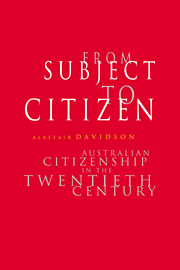Book contents
- Frontmatter
- Contents
- List of Figures
- List of Tables
- Acknowledgments
- Abbreviations
- Introduction
- PART I From Subject to Citizen 1901–1996
- Part II Discourses of Exclusion
- Part III The Active Citizen and Beyond
- 7 The Active Citizen and Direct Democracy in Australia
- Conclusion
- Notes
- Select Bibliography
- Index
7 - The Active Citizen and Direct Democracy in Australia
Published online by Cambridge University Press: 06 January 2010
- Frontmatter
- Contents
- List of Figures
- List of Tables
- Acknowledgments
- Abbreviations
- Introduction
- PART I From Subject to Citizen 1901–1996
- Part II Discourses of Exclusion
- Part III The Active Citizen and Beyond
- 7 The Active Citizen and Direct Democracy in Australia
- Conclusion
- Notes
- Select Bibliography
- Index
Summary
This is the most important question probably that we have to consider in this bill. I think that there can be no doubt whatever that a clear case can be made for the absolute necessity of giving only one vote to each man, and giving every man a right to vote on the question of returning representatives to the central parliament.
Sir George Grey, New Zealand delegate to the 1891 ConventionWe believe one vote one value is an essential principle of democracy. It is fundamental to a sense of meaningful participation in Australia's democratic polity.
Constitutional Commission, 1988It is important to state at the outset that there is practically no evidence that the fathers of the Australian Commonwealth Constitution had any intention of making the people sovereign through the principle of one person, one vote – and what concern they did show was replaced more and more by a concern for technicalities at each succeeding Constitutional Convention of the 1890s. This reluctance to deal with the problem reflected the absence of a popular movement for Federation here, and the fact that it was finally voted in by a minority of the population.
At the first meeting of delegates at the Australasian Federal Conference in Melbourne in 1890, Sir Henry Parkes, the deus ex machina of the federal movement, noted that: ‘We are asked to decide whether there is such a wave of popular opinion throughout these colonies that it has removed the question [that is, of Federation] from the mere sentimental airiness in which it has existed for some years past and has brought it into the region of practical polities’.
- Type
- Chapter
- Information
- From Subject to CitizenAustralian Citizenship in the Twentieth Century, pp. 223 - 247Publisher: Cambridge University PressPrint publication year: 1997



